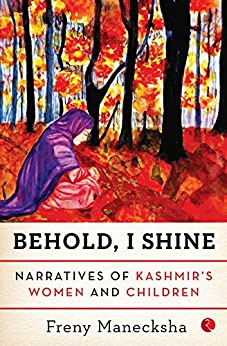Why I picked this book?
Behold , I Shine – Narratives of Kashmir’s Women and Children is a book that presents a narrative from the perspective of Kashmiri women and children. I have read a few books about Kashmir and most of them are about the conflict, its genesis, and the reason behind it. The books I read are about the history of Kashmir and the various rulers who have ruled Kashmir over time and about the syncretic culture of Kashmir. This book as the name suggests was from the perspective of the Kashmiri women and children, their struggles, challenges, pain, and hope during the ongoing conflict. Kashmir is one place I want to understand and know more about, so any book on Kashmir interests me, so I decided to read this one.
The book
What is about?
As the name suggests, the book is about knowing and understanding the impact of the ongoing conflict in Kashmir on women and children. It talks about the various ways the women and children were affected in Kashmir and how they cope with it. The stories of mothers of disappeared children, wives of disappeared husbands, and the children of disappeared or killed fathers. It talks about the changing landscape and how the militarization of Kashmir valley is shrinking the public space for the people of Kashmir and especially women. The book provides insight into how women are coming forward not only to fight military oppression but also the patriarchy which is deep-rooted in some of the Kashmiri Muslim societies. The author interviews many women to provide us their views and perspective.
Who can read it?
Anyone who is interested to know about Kashmir. Anyone who is interested to know the views and perspectives of Kashmiri women and children about the violence and conflict. This book will surely engage someone who genuinely wants to know and understand how Kashmir has changed for the women of Kashmir since the 1990s, when the armed struggle for freedom started in Kashmir. It talks about how the condition of women changed because of Kashmir’s freedom struggle, and the heavy militarization of Kashmir. The impact of frequent curfews, cordon and search operations, enforced disappearance of men and children, and the fightback and legal battles of Kashmiri mothers and wives. So, if you are interested to know more about the above this is one for you.
Inside the book
For most Kashmiris, the massive deployment of security troops and the presence of armed policemen around, is ‘occupation’. For most Indians the presence of military and the police within the valley is normal, even reassuring – a way of preserving national unity and security, and a means of countering the ‘destabilizing’ forces behind Kashmir’s freedom struggle.
The above paragraph from the book sums up the generic views most of us have about the situation in Kashmir. The book talks about the perspective of the Kashmiri women who view it as ‘occupation’, which has not only shrunk their shared spaces but also taken control over their lives. During the interview with the author, many women shared their plight and what they have gone through over the years.
There are stories of pain, struggles, and challenges as well as courage, determination, and strong will. The book has interviews of many women who have lost their husbands, sons’, and fathers to the conflict, some dead, and others disappeared. Reading their stories makes you understand how they have to fight multiple battles not only for justice but with their own family members and society. Often the wives of the disappeared are not treated well by their in-laws and are held responsible for the disappearance of their husbands. One would come across many such stories in the book.
The author interviews some of the brave and courageous women who despite all odds stood up for truth and justice. There are many such women, one among them is Parveena Ahangar, whose son was picked up by security forces and never came back. She visited every jail in J&K and in other parts of India in search of her son but to no avail, however, in the process, she realized that there are many like her and thus came into existence the Association for Parents of Disappeared Persons (APDP). She and her organization are fighting many legal battles for the disappeared persons.
The book is a searing account of the women of Kashmir post-1990s. There are poignant stories of the loss of loved ones and the pain of the disappeared mothers and wives, and amidst all this, there are stories of resistance, dissent, courage, and hope. The book documents how violence and militarization have changed the lives of women and children of Kashmir.
About The Author
Freny Manecksha is an independent journalist from Mumbai. She left mainstream journalism after some 20-odd years to pursue her areas of interest which include development, gender and human rights. For the past eleven years, she has travelled and written extensively from Kashmir and Chhattisgarh and has been published in Himal South Asian, The Wire, Raiot and PARI. She is the author of Behold, I Shine Narratives of Kashmir’s Women and Children
Our Verdict
Behold , I Shine – Narratives of Kashmir’s Women and Children is a book that captures the pain, sorrows, anger, frustrations as well as courage of the women of Kashmir. A must-read to understand how violence and militarization impact the lives of women and children in Kashmir.
